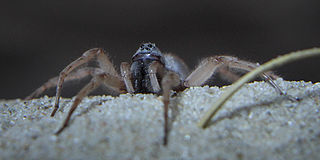Rhagodia is a genus of rhagodid camel spiders, first described by Carl Friedrich Roewer in 1933.

Galeodes is a genus of solifuges or sun spiders. The nearly 200 species in this genus are found in northern Africa, southeastern Europe and Asia. Like other solifuges, they are mainly nocturnal and found in arid habitats. They often have long hairy appendages and are not as stout bodied or dark and contrastingly coloured as some other solifuges. Some Galeodes species are able to produce sounds by stridulation. These are usually raspy or hiss-like and may be imitations of the sounds of vipers, to serve a defensive function. As in other solifuges, mating involves the male depositing a spermatogonia that is manipulated into the female genital opening using their chelicera. The male strokes the female using the palps allowing her to be approached. Females will often feed on males before or after mating. The female then deposits the eggs in a burrow in soil and in some species guards them.

Allocosa is a spider genus of the wolf spider family, Lycosidae. The 130 or more recognized species are spread worldwide.

Olios is the largest genus of huntsman spiders, containing 166 species. They are found throughout the world, with most species occurring in hot countries. The genus was first described by Charles Athanase Walckenaer in 1837.

Rhagodidae is a family of solifuges, first described by Reginald Innes Pocock in 1897.

Zeria is a genus of solpugid camel spiders, first described by Eugène Simon in 1879.

Oxyopes is a genus of lynx spiders found worldwide. It includes arounds 300 species and is classified under the lynx spider family Oxyopidae. Like other lynx spiders, they are easily recognizable by the six larger eyes arranged hexagonally on top of the head (prosoma), with the remaining smaller two eyes in front. They are also characterized by long spine-like bristles (setae) on their legs. They are ambush predators, actively hunting prey by sight. Though they produce and use silk, they do not build webs to capture prey.
Ceroma is a genus of ceromid camel spiders, first described by Ferdinand Karsch in 1885.
Biton is a genus of daesiid camel spiders, first described by Ferdinand Karsch in 1880.
Blossia is a genus of daesiid camel spiders, first described by Eugène Simon in 1880.
Gluviopsis is a genus of daesiid camel spiders, first described by Karl Kraepelin in 1899.
Rhagoditta is a genus of rhagodid camel spiders, first described by Carl Friedrich Roewer in 1933.
Rhagoderma is a genus of rhagodid camel spiders, first described by Carl Friedrich Roewer in 1933.
Rhagodinus is a genus of rhagodid camel spiders, first described by Carl Friedrich Roewer in 1933.
Rhagoduna is a genus of rhagodid camel spiders, first described by Carl Friedrich Roewer in 1933.
Rhagodes is a genus of rhagodid camel spiders, first described by Reginald Innes Pocock in 1897.
Zeriassa is a genus of solpugid camel spiders, first described by Reginald Innes Pocock in 1897.
Solpugyla is a genus of solpugid camel spiders, first described by Carl Friedrich Roewer in 1933.
Solpugassa is a genus of solpugid camel spiders, first described by Carl Friedrich Roewer in 1933.





